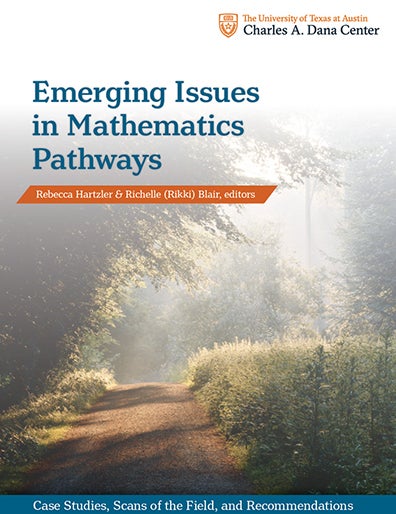
Co-requisites and Mathematics Pathways
This is the second in a series of blog posts exploring topics in the recently released Dana Center Mathematics Pathways (DCMP) monograph Emerging Issues in Mathematics Pathways: Case Studies, Scans of the Field, and Recommendations. You can download the monograph, in full or as individual chapters, from the DCMP website.
The first blog post in the series was Rikki Blair’s account of the genesis of the math pathways movement. Find it here.
One of the hot topics in the mathematics pathways movement is the co-requisite approach to developmental math education. For students who are assessed as needing extra help to reach “college readiness” in their first years of postsecondary studies, traditional approaches to developmental or remedial mathematics can lead to serious obstacles, even preventing students from completing a degree.
Connie Richardson, manager for the Dana Center’s Higher Education Course Programs, has spent several years helping to guide colleges and universities in the successful design and implementation of co-requisite courses. Along with the Dana Center’s Jennifer Dorsey, Connie wrote “Key Considerations in Designing Co-Requisite Supports," chapter 5 of the new Emerging Issues in Mathematics Pathways monograph.
We recently caught up with Connie to chat about co-requisites, the challenges they try to address, and some of the complexities of making them work.
Q: What are some of the positive impacts the co-requisite approach can bring to students?
Connie Richardson: It helps if we think about the alternative which, in most cases, is long sequences of developmental math courses.
At times, students may be required to take three or more semesters of developmental mathematics before they can enter “college-level” math studies. Long developmental sequences cost students time and money. Even if they're being successful, they're still accumulating a lot of credits that don't count toward their degree plans. In many cases, this prevents them from getting to the courses that are required for their degrees.
Additionally, those long developmental course sequences disproportionately affect students who are underrepresented minorities. It’s an equity issue that must be addressed.
Q: What do you think leads to some of that disproportionate impact on underrepresented students?
CR: Some of it has to do with placement policies. Those can be a big part of the inequity. A lot of institutions use a single test score, such as a readiness exam, alongside maybe an ACT or SAT. It’s a very limited predictor of student success.
What we recommend, and what the research shows to be successful, is the use of multiple measures of student performance: high school GPA, high school math courses taken, high school math course GPA, and a test score. More and more institutions are also starting to incorporate some psychosocial factors, so they’re now measuring student “grit” and other factors that can predict future student success much more accurately. Georgia’s institutions are one example. They collect something like 800 data points on each student. They’re looking at grades, survey inputs, course taking behaviors, grit—all of that.
Q: What kinds of instruments are available for that type of assessment?
CR: There are a ton! At our workshops, we share a list that has 20 or more different instruments.
Q: You’ve been helping colleges and universities implement co-requisites for math education for several years. Beyond looking at and revising placement policies, what other factors do institutions find challenging in designing and implementing co-requisites?
CR: There can be challenges around staffing. For example, entering freshmen generally take three hours of mathematics. With co-requisites, a significant portion of the freshman class may be taking five or six hours of math. That puts a lot of pressure on the math department to staff all of those classes.
We see some struggle with supports and culture as well. We like to talk about “wrapround supports” for students. Those can include early interventions if, for example, a student is performing poorly or is skipping class, but supports also include making sure students know where the tutoring lab is and that they feel comfortable going there.
At some institutions, developmental courses act as a filter. It’s kind of like “Well, we’re going to see if you can jump over these hurdles. If you can jump these hurdles successfully, then you can enter my college-level class.” Many students who are otherwise being successful just stop attempting to jump the hurdles. Helping students to learn to navigate the system, and changing the system to remove barriers, can go a long way to improving outcomes for students.
Q: Altogether, this mix of factors such as placement policy, creating “wraparound supports,” promoting buy-in and cultural shifts, staffing, and so on sounds very complicated.
CR: It is complicated! It can take a sustained, coherent effort on the part of people from several areas in an institution to accomplish a well-designed co-requisite implementation. It gets even more complicated because every campus is different. Even under the umbrella of the “co-requisite approach,” there are multiple models for how to actually do it.
This is why we offer a two-day co-requisite design workshop so that campus teams can quickly learn about these challenges and our recommendations for how they can be addressed in a way that is customized to each institution’s context.
Q: Between the monograph chapter and these workshops, you obviously have a major focus on the co-requisite approach. Any final thoughts?
CR: We don’t want to separate co-requisites from the idea of math pathways. We want students in the appropriate course, right? Co-requisites get students into college-level math early compared to traditional developmental approaches. Getting the appropriate math and getting it early can be really impactful for a student’s overall success.
Find out more about the co-requisite design workshop Connie mentioned.
For more about co-requisites and many other hot topics in mathematics pathways, explore the Emerging Issues in Mathematics Pathways monograph.
Get in Touch
We collaborate with state districts and teachers to develop innovative curricula, resources, and professional development.

